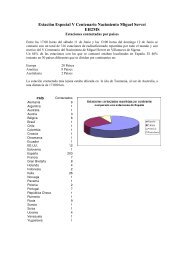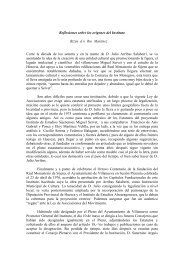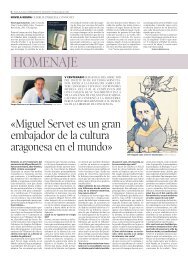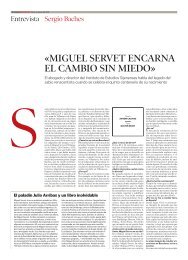New Page
New Page
New Page
Create successful ePaper yourself
Turn your PDF publications into a flip-book with our unique Google optimized e-Paper software.
the Transylvanian Antitrinitarians.<br />
It is interesting, however, that Ferenc Dávid, who made ample use of Restitutio while writing his<br />
work, does not elevate the thoughts formulated in the 1542 preface of the Paginus Bible edited by Servet<br />
to the level of principles. The preface explains that due to the richness of the Hebrew language what we<br />
read in the Old Testament cannot be translated into other languages. Therefore, only one who knows<br />
Hebrew and the history of the Jews can undertake to interpret the writings of the prophets. He emphasizes<br />
the importance of the history of the Jews by claiming that it is impossible to properly interpret the<br />
prophets without a thorough study of the historical books of the Old Testament. These conditions lacking,<br />
the interpreter eliminates from the prophecies the literal and the historical meanings (sensus litteralis and<br />
sensus historicus), looking everywhere for the figurative meaning (sensus misticus) only. Thus, according<br />
to Servet, this latter sense can be clearly discovered only if based on the often neglected historical meaning.<br />
During the later debates, while interpreting the psalms or the books of the prophets, Ferenc Dávid<br />
also follows this principle, but here he does not declare it. The discussions relating the differences<br />
between the Old and <strong>New</strong> Testaments, or the requirement to look for a spiritual meaning beyond the<br />
literal in the Scripture are only similar to, but definitely not identical with, the Servetian rehabilitation of<br />
sensus historicus. And we have seen in the fourth article that the Transylvanian Antitrinitarian is not so<br />
strict about the knowledge of languages as was his Spanish predecessor.<br />
The reason for that is mostly the popularizing tendency of the Hungarian text. Dávid, also considerate<br />
of +simple readers", does not wish to scare lay readers by declaring that they have no competence to<br />
independently interpret the Bible because they do not know Hebrew or Greek. This would contradict the<br />
tendency of Antitrinitarian propaganda, which preaches simplicity and intelligibility.<br />
So the correct interpretation of the Scripture in this work of Ferenc Dávid is based not on learning<br />
or knowledge, nor does it depend on whether the interpreter has mastered certain procedures, but relies<br />
crucially on ethical criteria. He expounds this in several places, while vividly formulating the quest of the<br />
interpreter not restricted by clerical authority: +Someone might raise a question at this point. Is thus all<br />
the Scripture to be explained in a different way, @külemben not as the letter shows it, and is the meaning<br />
of Christ's soul to be found in all Scripture? Who shows us that meaning, and in what book, in what exegete<br />
Doctor are we to find the true meaning of the Scripture? Furthermore, these kinds of exegesis, on<br />
the other hand, bring us to the opinions of men and commit us to follow the meaning recovered from their<br />
thought, thus freedom being given for every one to freely and after their own heads explicate the<br />
Scripture, which is the cause of many a heresy and controversy."103 We have seen what he thinks of the<br />
opinion of the exegete doctors. It is no less interesting what he thinks of the controversies. It is in the<br />
conclusion concentrating exclusively on this problem that he most exhaustively spells out that he regards<br />
conflicts and contests as natural phenomena, though, as it also turns out, not in the long run but only until<br />
the truth he confesses to is victorious. In that sense altercations are caused only by that +the devil in hell,<br />
who is the head of darkness, strongly guards those he keeps in it and resents if, freed from that, they are<br />
brought to the true knowledge of Christ and His word..."104 Thus Dávid is convinced that this is a<br />
transient phenomenon only, and he believes to prove with the examples of the prophets, Christ and the<br />
apostles that the victory of light over darkness has always been at the cost of great struggle. He offers the<br />
consolation that it is better for his readers to struggle with the Scripture than later with remorse.<br />
What guarantees, however, that the author of the work is in possession of the true knowledge of<br />
the Scripture, that he has really considered +the true straightness and flow of the Scripture"? Dávid<br />
answers this question by describing the process of his illumination. He relates that a believer is first<br />
bewildered under the weight of the many contradicting biblical passages, trying in vain to reconcile them<br />
until he sees that since he cannot succeed without God's help he must turn to Him. This is the first stage<br />
of elucidation. This is followed by the second, where man denies himself and understands the word: +In<br />
such denial of ourselves we shall be true disciples of Christ, taking up the cross, following Him, being<br />
instructed by Him, and coming to the Lord, the obscurity of our eyes and the hardness of our heart will be<br />
36







